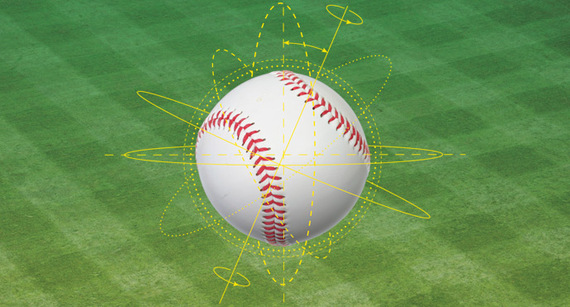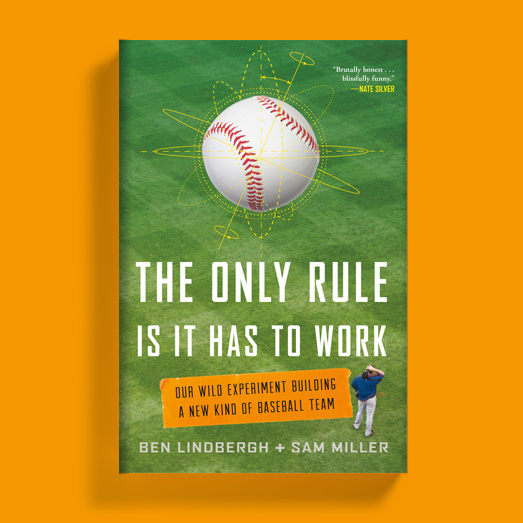Not Joking at All
Sam is sitting in the passenger seat of his 2011 Honda Fit, which is parked inside his garage in Long Beach, California. I'm sitting in my 2005 fading, faux-leather desk chair, which is parked inside the small office in my Manhattan apartment. Sitting between our sound-dampening sanctuaries (where we're trying not to wake Sam's wife or my girlfriend) is former Los Angeles Dodgers general manager Dan Evans, who's in an Arizona hotel on a spring training scouting trip, talking to us on Skype.
It's March 2013, just after midnight my time, and Sam and I are interviewing Evans for the latest episode of Effectively Wild, the daily podcast we record for Baseball Prospectus. Midway through the call, we ask him about his new job, a side gig as the commissioner of the Northern League, an independent circuit that he's trying to bring back from the dead. Indy leagues are like the minors, except that they're even more minor: They employ professional players, but they aren't affiliated with major league organizations. This means they don't take orders from above, but it also means that most of them are in perpetually critical financial condition, one down year away from drowning in debt and leaving only ripples behind. The Northern League, which fielded teams in Minnesota, South Dakota, Iowa, and Ontario, was founded in 1993 and winked out of existence in 2010. Now Evans is trying to wink it back in again. And to do that, he tells us, he needs investors to take on teams.
"If you're asking," I say, "Sam and I will take one team."
Everyone laughs, but cohost telepathy tells Sam I'm serious. I sense the same about him.
"I wonder how many people in this conversation are joking, because at least two of us are not joking at all," Sam says.
Evans responds by extolling the virtues of indy-league life. "Unlike a minor league franchise, where you have no say in the players . . . everything in the independents is under your jurisdiction," he says. "For some people, that's really intimidating. For other people . . . they see that and they go, 'Oh my gosh, this is my real fantasy team.' "
We don't need any additional selling. We spend the rest of the podcast distracted, sending silent text messages to each other and trying to contain our excitement. Once we're off the air, we ask Evans if he was just humoring us or if it's safe for our hopes to be high.
"Down the line, if you guys are really serious, I would actually entertain something like that," he says. We feel as if a real GM has just walked us to the war room where teams talk strategy, flashed his credentials, and assured security that we're with him. After Evans is off the line, Sam and I instant message into the night. We're already playing out all the implications, wondering which ideas we'd test out if we owned a team and could be the bosses of our own baseball sandbox. "I might not sleep again until we have a baseball team," I say to Sam.
Once the sun is up and I can send emails without looking like a vampire, I contact our boss, Joe Hamrahi, the president and CEO of Baseball Prospectus and a friend of Dan Evans. Joe, can we buy a baseball team? Can we? Can we?
"They want a lot of money," Joe writes back. He keeps me in suspense until the answer to my "How much money?" follow-up appears: "$250,000."
I have three minutes to mull over that massive-sounding amount before another email arrives. "By the way, that's just the admission fee," Joe adds. "Then you have to come up with the capital to operate the team, pay the players, the front office, lease the ballpark, run concessions, etc. And you're not talking about real players here. These are has-beens and guys looking for some shot at getting into real baseball."
Well, hell, so are we. Sam and I aren't old enough to be "has-beens" in every respect, but we qualify when it comes to our childhood hopes. Sam was that skinny ten-year-old who pictured himself hitting the World Series–winning home run. Like every amateur hero before him, he sprinted around the imaginary bases as though the earth were crumbling behind him, leaping and skipping, pumping a fist, throwing a helmet, voicing the cheers of each of the thousands of fans who sounded so loud in his head. Over the course of a quarter century, that pretend applause went silent. In the saddest perversion of a sports-movie montage, it became increasingly clear to Sam that he would never hit that home run. He was too shy, then too small, then too distracted, then too old. Finally, he was simply too realistic.
I grew up five years later, after the steroids era had given athletes comic-book bodies. I had no illusions about displacing Alex Rodriguez, but I could see myself as the successor to the New York Yankees' general manager, Brian Cashman. GMs and other team executives look the way we would if we wore more expensive suits. They're the sports heroes of the computer age, and they've instilled in us the oh-so-tantalizing notion that we could do that. Thinking along with the GM is the new national pastime. In its most mocked form, this fetish for front offices is known as "rosterbation," a word that captures a fan's sometimes-delusional attempts to engineer the perfect transaction. In its most mainstream form, it's fantasy sports, a multibillion-dollar industry now served by an array of statistical resources so granular and accessible that anyone can retrieve far more data from a home computer than Oakland Athletics GM Billy Beane did in his famous Moneyball season.
My mental montage was more sedate than Sam's, but still satisfying: Making the perfect pick on draft day. Swindling a rival team in a trade. Landing the high-priced free agent who lays waste to the league. I came closer to my dream than Sam did to his: I became a baseball operations intern for the Yankees straight out of college, sitting with other interns in an office inside Yankee Stadium where every so often Cashman himself would walk by, saying hello (or activating his beloved handheld fart machine) on his way to continue trade talks or address the press. He knew, and we knew, that everyone in the room had designs on his job.
Sign up for more essays, interviews and excerpts from Thought Matters.
ThoughtMatters is a partnership between Macmillan Publishers and Huffington Post
I had good timing: It was 2009, the year the Yankees beat the Philadelphia Phillies to win their first World Series since their (most recent) dynasty team. After Game 6, in which New York's Andy Pettitte outdueled a past-his-prime Pedro Martinez in Pedro's last-ever outing, I sipped champagne in the clubhouse while CC Sabathia smoked a cigar, Kate Hudson lounged on A-Rod's lap, and Kurt Russell talked intently to Mark Teixeira. After the fans had reluctantly cleared out, the players had hit the town, and the empty stadium was ours again, I did tipsy cartwheels on the field with the rest of the front office. Later that week, I rode on a duck boat with the rest of the interns in the ticker-tape parade as a horde of pinstriped strangers on lower Broadway chanted, "WHO-ARE-YOU? WHO-ARE-YOU?" and bombarded us with whole rolls of toilet paper. For the rest of the off-season, I slipped on my lanyard and badge as self-importantly as if I were putting on an actual uniform. My MLB.TV account had no blackout restrictions. I felt as if I belonged in baseball.
But the following spring, my time as an insider ended, almost without warning. On a day like any other, Cashman came in and told us he'd been ordered to bring in new blood, that the legal department was worried about interns staying more than a year, and that his hands had been tied by a hiring freeze. I tried not to be bitter about the news that the World Series-winning Yankees, who regularly dropped hundreds of millions on free agents who weren't worth the money, couldn't afford to convert a few underpaid interns into underpaid full-timers. It stung even more when the "hiring freeze" turned out to be a comforting fiction: Two of the senior interns got to stay as full-fledged staffers. My skill set, it seemed, just wasn't special enough for the team to make an exception.
So what do you do when the guy whose job you grew up wanting to do kicks you (very gently) to the curb? I could have tried to parlay my year with the Yankees into another team internship, eventually ascending to a GM role with another organization and, in my moment of triumph, exacting revenge for my freeze-out by taking Cashman to the cleaners in a lopsided deal. Instead, I steered into the skid and went back to the baseball writing I'd begun in college. In time, I came to believe that the Yankees had done me a favor by pushing me into a role for which I was a far better fit. But now, having spoken to Dan Evans, I see a way to bypass the intern stage and skip directly to running a team. I'm eager to test myself, even in an upstart indy league. Neither Sam nor I had ever completely let go of that one special fantasy, the last lingering what-if: Could we "crack" baseball if we could borrow a GM's job and live it for a single season? How would we be altered? And how would we alter a team?
Unfortunately, we don't know anyone with six figures to throw away on someone else's wish fulfillment. Evidently Dan doesn't either: The new Northern League never gets off the ground. Sam and I don't dismiss our vision of running an indy team, but without an obvious outlet we put it on the back burner. And the longer it sits there, the sillier and less realistic it seems.
It took a podcast conversation to inspire this far-fetched idea; it takes another to make it more real. Sixteen months and hundreds of Effectively Wild episodes later, a listener's email prompts us to admit on the air that we've never attended an independent-league game. Some hours after that show ends, a message appears in Sam's inbox. "I hear you're looking for an invite out to an independent league game," writes Tim Livingston, the director of broadcasting and media relations for the Sonoma Stompers, a franchise in the fledgling, four-team Pacific Association of Professional Baseball Clubs, which rose out of the ashes of the North American League (itself a chimera created from the remnants of three earlier leagues). "I think it would be great if you could come by to watch." So does Sam.
Copyright © 2016 by Ben Lindbergh and Sam Miller. Excerpted from The Only Rule is it Has to Work
Ben Lindbergh is a staff writer for FiveThirtyEight and, with Sam Miller, the cohost of Effectively Wild, the daily Baseball Prospectus podcast. He is a former staff writer for Grantland and a former editor in chief of Baseball Prospectus. He lives in New York City.
Sam Miller is the editor in chief of Baseball Prospectus, the coeditor of Baseball Prospectus's annual guidebook, and a contributing writer at ESPN The Magazine. He lives on the San Francisco peninsula with his wife and daughter.
Read more at Thought Matters. Sign up for originals essays, interviews, and excerpts from some of the most influential minds of our age.


